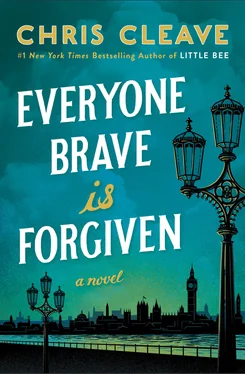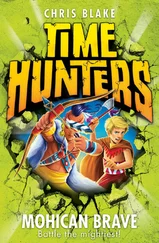Mary had Tom see everyone down the stairs while she went to the boiler room and shut off the electricity, the gas and the water. Back in the classroom she checked that no one remained. She tucked the Christ doll under her arm, closed the piano lid and walked down into the basement.
There was a confusion of places and a nervous laughter among the adults. The children squabbled for seats on the two long gymnasium benches that Mary had set up when she cleared the basement.
Mary clapped her hands twice. “Right. Grown-ups, please move those benches as close to that back wall as you can, and sit on them. Leave this space in front clear — this will be our stage. It’s less room than we’ve practised in, so shepherds, I need you to keep your flocks close, and angel — where are you, Kenneth? — angel, I need you to watch where you flap your wings. Betty and Maud, more candles, please, in those jars, and put them on the floor along the walls. Yes, anywhere there is good. And now, children, places as you were, please, and George, please can you bring that stool for Thomas to sit on? Very good. All right, then, we shall go from ‘And the angel said … ’ ”
“Behold!” said Kenneth. “Behold!”
In the candlelight, the audience cheered. The children made no more mistakes and Mary sat to watch them, while the distant concussions of the raid sounded through the underground walls. The candle flames shone on the ancient shelves that lined the basement. The yellow light glinted on the dented globes. It glowed on the musty needlework. It made the laid-down maypoles into long bones, white in the darkness.
When it came time for the next hymn, Mary took a glockenspiel from its pine box, gripped the wooden beaters, and frowned at the instrument. It might be harder than she had allowed.
“Here,” said Zachary’s father, “let me have that. What’s the song?”
“ ‘No Room in the Inn.’ ”
He began straight away, giving two bars and nodding the children in. He played evenly, not making any more fuss of the tune than it needed. Mary closed her eyes while the children sang.
Later, when Mary and Joseph had lain the doll in the glockenspiel case that took the place of the manger, and after the last hymn, the play was over but the bombing raid was not. The explosions came through the ground, no nearer but no fewer. The children clustered on the benches in the arms of their parents and waited for the all-clear. People spoke in whispers, as if the war were listening. Since there was nothing else to watch, they all looked at the doll in the manger with the candles ringed round it in jars.
Mary sat beside Tom on the end of a bench. “Feeling Christmasy?”
“As an elf in rum butter.”
She put her head on his shoulder. “Like it down here?”
He gave the basement a critical eye. “It could use a woman’s touch.”
She dug him in the ribs. “I hate you.”
“This school is yours now, you know. I mean, after the war, everyone will come home and I daresay you’ll have to hand the place back, but you and I will know who held the line when it mattered.”
“Oh, I’ll be glad to give the key back. It’ll be a relief not to be in charge.”
“I don’t see you, somehow, taking orders from Miss Vine. Not after this.”
“No?”
“I don’t see any of it being as it was. Just look at us, down here in the dark. Coloreds and cripples and cranks — but we’re the ones holding on. When the rest get back they’ll have to respect what happened here.”
Mary yawned, and stretched out her legs alongside his. “I just want to get through. I must say I don’t frightfully care who feels good once this is over, so long as it isn’t the Germans.”
He grinned. “I don’t care about anyone at all, apart from you. If there is one person who—”
Three huge detonations came, knocking the breath from their lungs and blowing out the candles. Children and parents screamed. Mary found herself stunned, lying on top of Tom, both of them struggling to get up. She fumbled in her pockets until she found her lighter.
Zachary was staring back at her, eyes wide with terror.
“It’s all right,” she mumbled, her tongue pasted with brick dust. She was slow from the concussion. “It is quite all right. Quite safe down here.”
Another explosion came, huge and even closer, knocking the lighter from her hand. When she felt for it and flicked it back on, Zachary was gone. His footsteps banged up the wooden stairs that led up from the basement.
“No! Wait!”
She made to go after him but Tom pulled her back. “I’ll get him.”
He went, leaving her to bring order to the tangle of parents and children. She got the candles alight in their jars, then checked on the injuries. Zachary’s father was badly concussed, swinging his head in confusion. Thomas’s father had dislocated a shoulder and sat on the floor with his back against the wall, green-faced. The children had got away with bruises.
Once she had them all calm, she took stock. Her ears rang — she must have struck her head harder than she had thought — but at least the bombing seemed distant, for now. She didn’t know how long Zachary and Tom had been gone — five minutes, perhaps. She went up into the corridor, stumbling on uneven legs — it seemed she had lost a shoe — and decided to take a quick look outside. She swung open the heavy front door and was amazed to find that it was still daylight. The street was deserted, with rubble strewn across it. A house was down in the middle of the row.
She looked up and saw no bombers. She took a few steps into the street, thought better of it, and hurried back into the shelter of the porch. It was ridiculous — it was bombs that threatened, not rain — and yet in the corner of the porch a wooden box held the parents’ furled umbrellas, and a sensible part of her mind realized that she ought to take one, since it must be better than nothing. She was reaching for one when she saw, through the open door, the child at the end of the street. He was Zachary’s build, but white, in a white sweater and shorts, and she yelled at him to come into cover. The child stared at her, backed away two paces, and fled.
It was five streets before she caught him, with bombs beginning to fall again close by. When she finally got hold of Zachary, his eyes were blank with fright. She dragged him into an angle behind a wall, and gasped to get her breath. He cowered, arms raised as if she might strike him, and she wondered how it had come to be that he was white, and she also wondered why he was afraid of her. He was crying tears of a brown liquid, and she would not understand until later that they were ordinary tears, cutting through the white dust.
“Why?” she managed to say. “Why is it always you who runs off?”
He howled, chest heaving. “I’m sorry… I’m so sorry…”
She shook her head. “You have to come back. We can’t stay out here.”
“I’m not going back in the basement.”
“Oh yes you jolly well are.”
She half dragged, half led him back through the air raid, which was all around them now, and in the mouth of a side street she saw that Tom was lying on the pavement, asleep in the snow with the winter sun slanting over him. It was a stress reaction she had read about — the mind shutting down when it all got too much. She would have to go back for him as soon as she had delivered Zachary to the shelter. (How extraordinary that she was the one who was calm in this situation; who could take in everything clearly and without panic.) She hauled Zachary back to Hawley Street, with the bombing seeming distant again, and here there was an interesting phenomenon. (How glad her father would be to know that his daughter could be cool in a crisis.) This was how it sounded in her mind, as she held Zachary by his thin wrist and felt the pulse in it while the drone note of the bombers faded away into the east: I am witnessing a phenomenon related to the bombing.
Читать дальше












